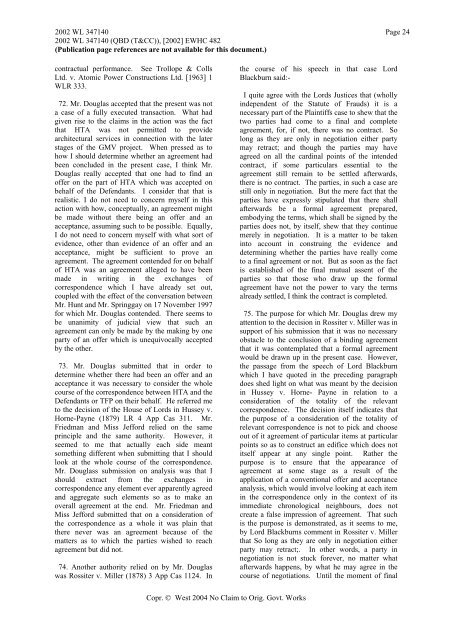Tesco v Constain - Thomson Reuters
Tesco v Constain - Thomson Reuters
Tesco v Constain - Thomson Reuters
Create successful ePaper yourself
Turn your PDF publications into a flip-book with our unique Google optimized e-Paper software.
2002 WL 347140 Page 242002 WL 347140 (QBD (T&CC)), [2002] EWHC 482(Publication page references are not available for this document.)contractual performance. See Trollope & CollsLtd. v. Atomic Power Constructions Ltd. [1963] 1WLR 333.72. Mr. Douglas accepted that the present was nota case of a fully executed transaction. What hadgiven rise to the claims in the action was the factthat HTA was not permitted to providearchitectural services in connection with the laterstages of the GMV project. When pressed as tohow I should determine whether an agreement hadbeen concluded in the present case, I think Mr.Douglas really accepted that one had to find anoffer on the part of HTA which was accepted onbehalf of the Defendants. I consider that that isrealistic. I do not need to concern myself in thisaction with how, conceptually, an agreement mightbe made without there being an offer and anacceptance, assuming such to be possible. Equally,I do not need to concern myself with what sort ofevidence, other than evidence of an offer and anacceptance, might be sufficient to prove anagreement. The agreement contended for on behalfof HTA was an agreement alleged to have beenmade in writing in the exchanges ofcorrespondence which I have already set out,coupled with the effect of the conversation betweenMr. Hunt and Mr. Springgay on 17 November 1997for which Mr. Douglas contended. There seems tobe unanimity of judicial view that such anagreement can only be made by the making by oneparty of an offer which is unequivocally acceptedby the other.73. Mr. Douglas submitted that in order todetermine whether there had been an offer and anacceptance it was necessary to consider the wholecourse of the correspondence between HTA and theDefendants or TFP on their behalf. He referred meto the decision of the House of Lords in Hussey v.Horne-Payne (1879) LR 4 App Cas 311. Mr.Friedman and Miss Jefford relied on the sameprinciple and the same authority. However, itseemed to me that actually each side meantsomething different when submitting that I shouldlook at the whole course of the correspondence.Mr. Douglass submission on analysis was that Ishould extract from the exchanges incorrespondence any element ever apparently agreedand aggregate such elements so as to make anoverall agreement at the end. Mr. Friedman andMiss Jefford submitted that on a consideration ofthe correspondence as a whole it was plain thatthere never was an agreement because of thematters as to which the parties wished to reachagreement but did not.74. Another authority relied on by Mr. Douglaswas Rossiter v. Miller (1878) 3 App Cas 1124. Inthe course of his speech in that case LordBlackburn said:-I quite agree with the Lords Justices that (whollyindependent of the Statute of Frauds) it is anecessary part of the Plaintiffs case to shew that thetwo parties had come to a final and completeagreement, for, if not, there was no contract. Solong as they are only in negotiation either partymay retract; and though the parties may haveagreed on all the cardinal points of the intendedcontract, if some particulars essential to theagreement still remain to be settled afterwards,there is no contract. The parties, in such a case arestill only in negotiation. But the mere fact that theparties have expressly stipulated that there shallafterwards be a formal agreement prepared,embodying the terms, which shall be signed by theparties does not, by itself, shew that they continuemerely in negotiation. It is a matter to be takeninto account in construing the evidence anddetermining whether the parties have really cometo a final agreement or not. But as soon as the factis established of the final mutual assent of theparties so that those who draw up the formalagreement have not the power to vary the termsalready settled, I think the contract is completed.75. The purpose for which Mr. Douglas drew myattention to the decision in Rossiter v. Miller was insupport of his submission that it was no necessaryobstacle to the conclusion of a binding agreementthat it was contemplated that a formal agreementwould be drawn up in the present case. However,the passage from the speech of Lord Blackburnwhich I have quoted in the preceding paragraphdoes shed light on what was meant by the decisionin Hussey v. Horne- Payne in relation to aconsideration of the totality of the relevantcorrespondence. The decision itself indicates thatthe purpose of a consideration of the totality ofrelevant correspondence is not to pick and chooseout of it agreement of particular items at particularpoints so as to construct an edifice which does notitself appear at any single point. Rather thepurpose is to ensure that the appearance ofagreement at some stage as a result of theapplication of a conventional offer and acceptanceanalysis, which would involve looking at each itemin the correspondence only in the context of itsimmediate chronological neighbours, does notcreate a false impression of agreement. That suchis the purpose is demonstrated, as it seems to me,by Lord Blackburns comment in Rossiter v. Millerthat So long as they are only in negotiation eitherparty may retract;. In other words, a party innegotiation is not stuck forever, no matter whatafterwards happens, by what he may agree in thecourse of negotiations. Until the moment of finalCopr. © West 2004 No Claim to Orig. Govt. Works
















